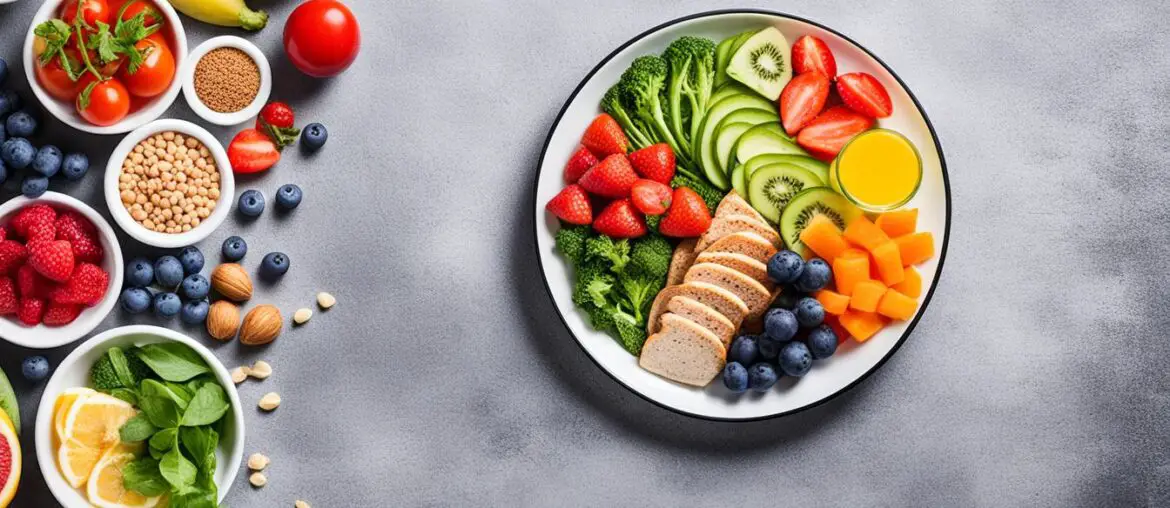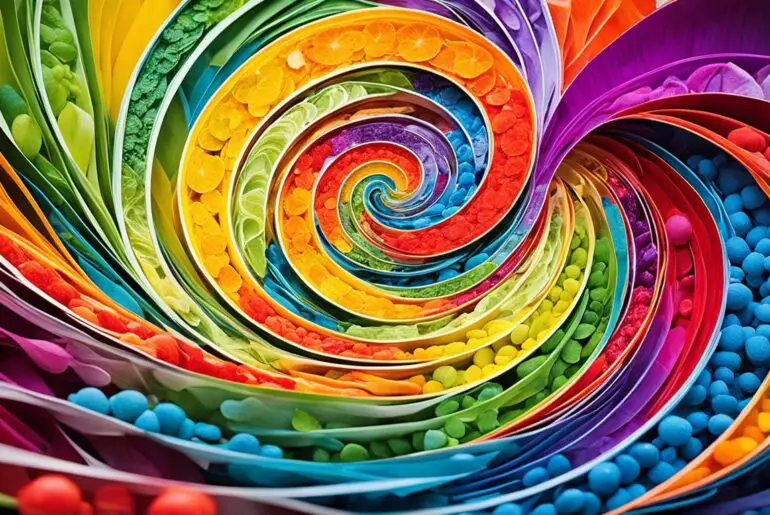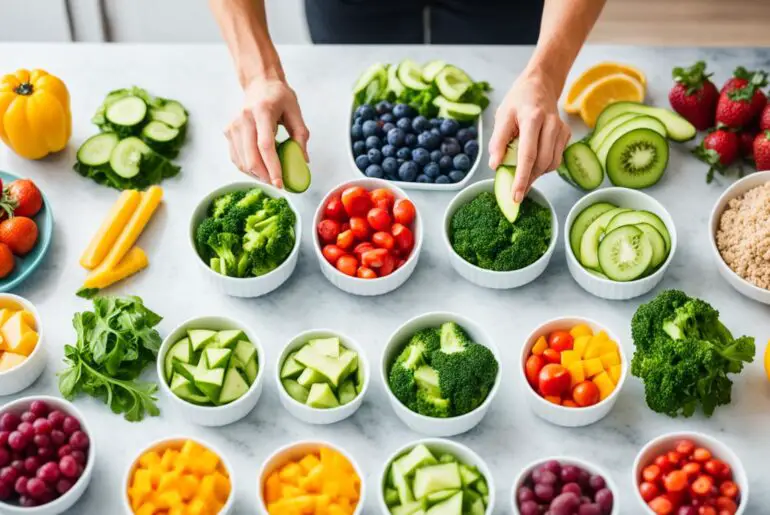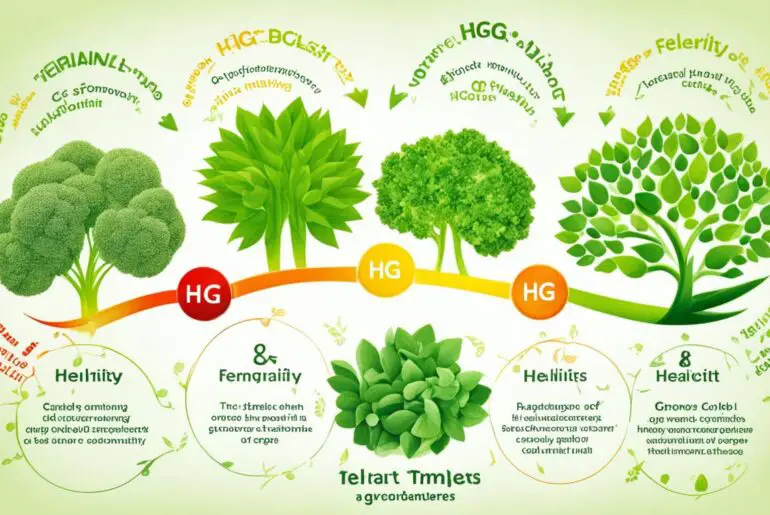Are you curious about the HCG diet and its impact on weight loss? Have you ever wondered how hormones play a role in this popular diet? Let’s delve into the fascinating world of the HCG diet, its approved food list, and how hormones are believed to affect our metabolism and body composition.
The HCG diet is a low-calorie diet that is often accompanied by supplemental HCG hormone injections. It claims to stimulate weight loss by burning stored body fat, but is there any scientific evidence to support this? And what exactly are the HCG approved foods that you can eat while on this diet?
In this article, I will uncover the truth behind the HCG diet, explore its three phases, and provide you with a comprehensive HCG diet food list. Join me on this journey as we separate fact from fiction and discover if the HCG diet is truly effective or just another weight loss fad.
Key Takeaways:
- The HCG diet is a very low-calorie diet that may involve supplemental HCG hormone injections.
- There is no scientific evidence to support the claims of the HCG diet for weight loss.
- The HCG approved foods include lean proteins, non-starchy vegetables, and limited fruits.
- The diet consists of three phases: loading, weight loss, and maintenance.
- Alternative weight loss options may be safer and more sustainable.
What Is HCG and How Does It Work?
HCG, or human chorionic gonadotropin, is a hormone produced during pregnancy. It plays important roles in ovulation, female fertility, and testosterone production in men. However, in the context of the HCG diet, HCG is used for a different purpose – weight loss.
The HCG diet combines HCG hormone therapy with caloric restriction to promote rapid weight loss. By supplementing the body with HCG hormones while following a low-calorie diet, it is believed that HCG enhances the body’s metabolism and promotes the breakdown of stored fat.
The theory behind this approach is that the HCG hormone stimulates the hypothalamus, which in turn releases stored fat into the bloodstream to be used as energy. This allows individuals on the HCG diet to consume fewer calories while still feeling satisfied and maintaining their energy levels.
It’s important to note that the HCG diet typically involves a caloric restriction of only 500 to 800 calories per day. This level of caloric intake is significantly lower than what is typically recommended for healthy weight loss, which is around 1200 to 1500 calories per day.
While the HCG diet may lead to rapid weight loss, it is important to approach it with caution and under the guidance of a healthcare professional. The safety and long-term effectiveness of the HCG diet have not been fully established, and there are potential risks and side effects to consider.
Next, we will explore the factors that affect metabolism and how they can impact weight loss.
Factors That Affect Metabolism
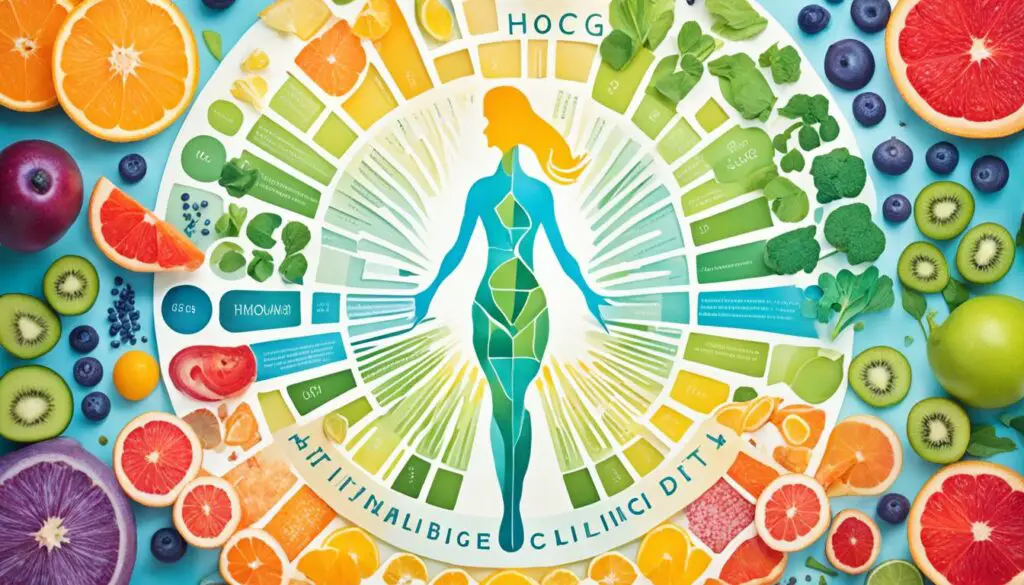
Several factors can affect metabolism, including age, dehydration, eating habits, genetics, hormones, inactivity, medication, sleep deprivation, stress, and vitamin deficiencies.
As we age, metabolism tends to slow down, contributing to weight gain and difficulty in losing weight. Dehydration can also negatively impact metabolism, as proper hydration is necessary for optimal metabolic function.
Our eating habits play a crucial role in metabolism. Consuming excessive carbohydrates and sugary foods can lead to weight gain and a slower metabolic rate. On the other hand, consuming a balanced diet with adequate protein, fiber, and healthy fats can support a healthy metabolism.
Genetics also influence metabolism to some extent. Some individuals may have a naturally faster metabolism, allowing them to burn calories more efficiently. Hormonal imbalances, such as thyroid disorders, can disrupt metabolic processes and lead to weight gain.
Inactivity and sedentary lifestyles contribute to a slower metabolism. Regular physical activity and exercise can help boost metabolism and promote weight loss.
Certain medications, such as antidepressants and corticosteroids, can affect metabolism and lead to weight gain. Sleep deprivation and chronic stress can also disrupt metabolic processes and make weight loss more challenging.
Vitamin deficiencies can hinder metabolic functions. Adequate intake of vitamins and minerals, such as vitamin D, B vitamins, and magnesium, is vital for a healthy metabolism.
Factors Affecting Metabolism:
- Age
- Dehydration
- Eating habits
- Genetics
- Hormones
- Inactivity
- Medication
- Sleep deprivation
- Stress
- Vitamin deficiencies
“The human body is a complex system influenced by various factors that can impact metabolism. From age and genetics to lifestyle habits and hormone levels, understanding these factors is crucial for managing weight and overall health.”
It’s important to note that while these factors can influence metabolism, they do not solely determine an individual’s weight or ability to lose weight. Each person’s metabolism is unique, and it’s essential to adopt a comprehensive approach that includes a balanced diet, regular physical activity, and lifestyle modifications tailored to individual needs and goals.
The Three Phases of the HCG Diet
The HCG diet follows a structured approach consisting of three phases: the loading phase, the weight loss phase, and the maintenance phase. Each phase serves a specific purpose in the overall weight loss journey.
Loading Phase
The loading phase marks the beginning of the HCG diet. During this phase, individuals consume high-calorie foods to build up their fat stores in preparation for the next phase. This phase typically lasts for two days and is crucial for ensuring the success of the weight loss phase.
Weight Loss Phase
The weight loss phase is the core of the HCG diet. It involves a drastic reduction in calorie intake while continuing HCG hormone treatment. Typically, individuals consume approximately 500 to 800 calories per day during this phase. The combination of calorie restriction and HCG hormone supplementation is believed to enhance metabolism and promote rapid weight loss.
Maintenance Phase
The maintenance phase is the final phase of the HCG diet. It gradually increases calorie intake while discontinuing the use of HCG supplements. The purpose of this phase is to stabilize weight loss and establish healthy eating habits for long-term success. It is essential for preventing weight regain and transitioning into a sustainable lifestyle.
The table below provides a summary of the three phases of the HCG diet:
| Phase | Description |
|---|---|
| Loading Phase | Consuming high-calorie foods to build fat stores |
| Weight Loss Phase | Drastic reduction in calorie intake while continuing HCG hormone treatment |
| Maintenance Phase | Gradually increasing calorie intake while discontinuing HCG supplementation |
By following these three phases, individuals can experience significant weight loss and adopt healthier eating habits. However, it is vital to consult with a healthcare professional before starting the HCG diet to ensure it is safe and suitable for your individual needs.
HCG Diet Food List
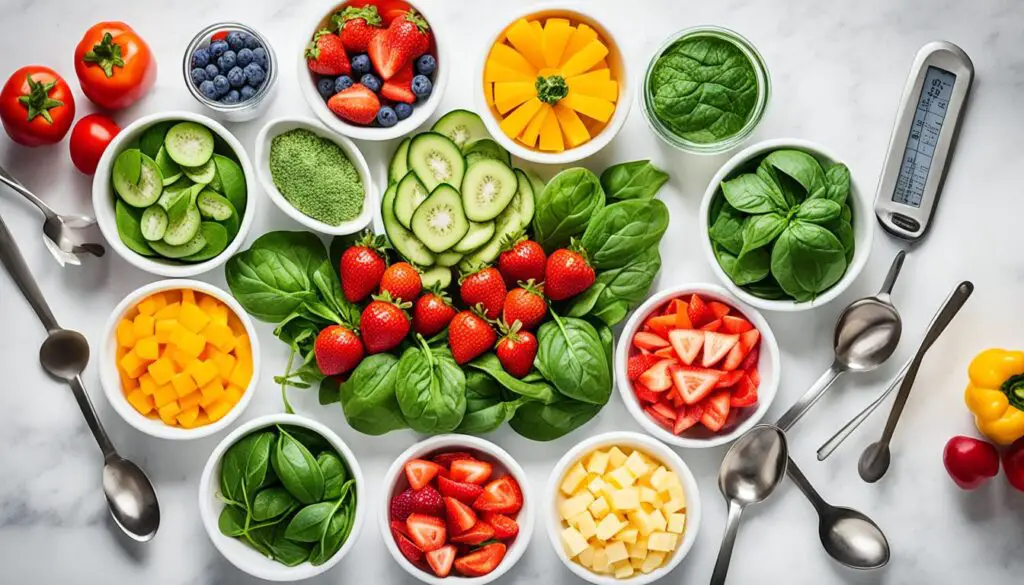
When following the HCG diet, it’s essential to adhere to the approved food list to achieve the desired results. This list includes a variety of lean proteins, non-starchy vegetables, limited fruits, and permissible seasonings and beverages.
Lean Proteins
Lean proteins play a crucial role in the HCG diet as they provide essential nutrients while helping to maintain muscle mass. Approved lean proteins include:
- Chicken breast
- Egg whites
- White fish (such as tilapia or cod)
- Lean beef (trimmed of visible fat)
Non-Starchy Vegetables
Non-starchy vegetables are low in calories and carbohydrates, making them an ideal choice for the HCG diet. These vegetables provide essential vitamins, minerals, and fiber. Examples of non-starchy vegetables allowed on the HCG diet include:
- Spinach
- Cauliflower
- Asparagus
Limited Fruits
Fruits are included in limited quantities on the HCG diet due to their natural sugar content. It’s important to choose low-sugar options while enjoying the benefits of essential vitamins and antioxidants. Recommended fruits include:
- Berries (strawberries, blueberries, raspberries)
- Citrus fruits (oranges, grapefruits)
Seasonings, Spices, and Condiments
Although the HCG diet is low in calories, it doesn’t mean sacrificing flavor. Approved seasonings and spices can enhance the taste of meals while staying within the dietary restrictions. Some permissible options include:
- Garlic powder
- Salt
- Pepper
Beverages
Proper hydration is crucial during the HCG diet. While following the diet plan, there are specific beverages that you can enjoy guilt-free. These include:
- Coffee (without sugar or cream)
- Tea (unsweetened)
- Water
By adhering to the HCG diet food list, individuals can enjoy a variety of delicious meals while promoting weight loss and maintaining overall health.
Foods to Avoid on the HCG Diet
When following the HCG diet, there are certain foods that should be avoided to maximize its effectiveness. These foods include:
Dairy Products
Avoid dairy products such as milk, cheese, and yogurt as they can be high in calories and carbohydrates. Instead, opt for alternatives like almond milk or coconut milk.
Carbohydrates
Carbohydrates like bread, pasta, and rice should be avoided on the HCG diet. These foods are high in calories and can interfere with the desired effects on metabolism and weight loss.
Fats and Oils
Avoid fats and oils such as butter, cooking oils, and salad dressings. These can add unnecessary calories and hinder the effectiveness of the HCG diet.
Sugary Foods
Avoid sugary foods like candy, soda, and desserts. These foods are high in calories and can lead to energy crashes and cravings.
Desserts
Stay away from desserts such as cakes, cookies, and ice cream. These treats are typically high in sugar and empty calories, which can hinder your weight loss progress on the HCG diet.
Beverages
Avoid beverages like soda, beer, and wine which can be high in sugar and calories. Instead, opt for water, herbal teas, or infused water for hydration.
By avoiding these foods, you can optimize your HCG diet experience and increase your chances of achieving your weight loss goals. Remember to consult with a healthcare professional or registered dietitian before starting any new diet plan.
The Effectiveness and Safety of the HCG Diet

The HCG diet is often touted as an effective weight loss method, but the scientific evidence supporting its claims is lacking. While individuals may experience rapid weight loss initially, this can be attributed to extreme calorie restriction rather than the effectiveness of the HCG hormone injections. The long-term sustainability of the weight loss achieved through the HCG diet is questionable.
Calorie restriction is a key component of the HCG diet, with individuals consuming as few as 500 to 800 calories per day. While such severe calorie restriction may result in initial weight loss, it is not a sustainable or healthy approach in the long run. This level of calorie restriction can lead to nutrient deficiencies, muscle loss, and a decrease in metabolic rate.
Safety concerns surround the use of HCG hormone injections for weight loss. The FDA has not approved HCG hormone injections for this purpose and has issued warnings about the safety and fraudulent weight-loss claims associated with HCG products. The use of unregulated and unauthorized HCG products can pose risks to individuals’ health and should be approached with caution.
While the HCG diet may promise rapid weight loss, it is important to consider the potential risks and safety concerns associated with this approach. Consultation with a healthcare professional is highly recommended before embarking on any weight loss program.
Safety Concerns of the HCG Diet
| Safety Concerns | Description |
|---|---|
| Lack of FDA Approval | HCG hormone injections are not approved by the FDA for weight loss. |
| Fraudulent Claims | The FDA has issued warnings about fraudulent weight-loss claims associated with HCG products. |
| Potential Health Risks | The use of unregulated and unauthorized HCG products can pose risks to individuals’ health. |
It is important to approach weight loss in a safe and sustainable manner. Rather than relying on extreme calorie restriction and unapproved hormone injections, it is recommended to explore alternative weight loss approaches that prioritize long-term health and well-being. Consulting with a healthcare professional can provide guidance and support in finding an individualized approach to weight loss.
Potential Risks and Side Effects of the HCG Diet
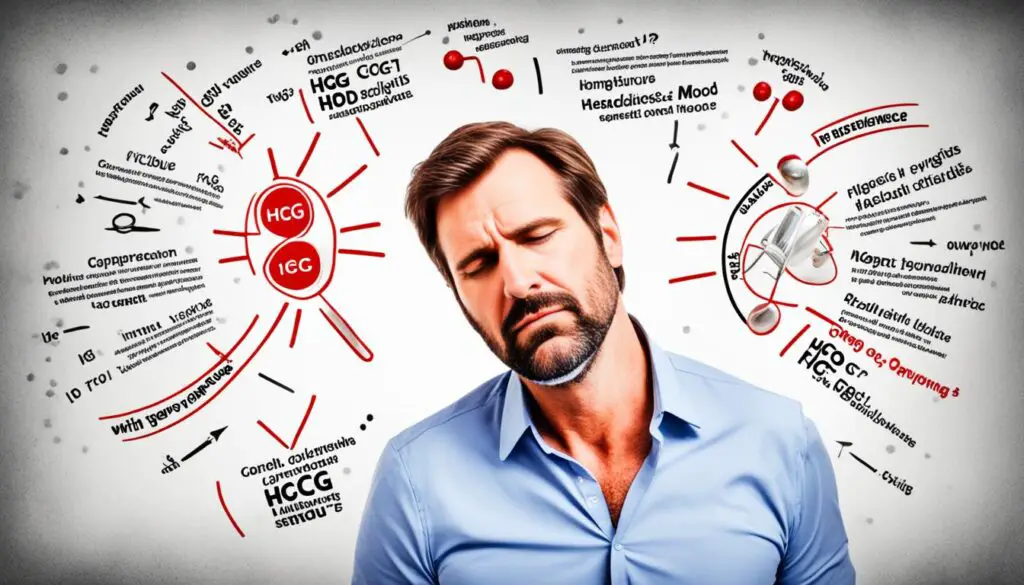
The HCG diet can come with several risks and side effects that individuals should be aware of before considering this weight loss plan. These include:
Risks
- Severe Calorie Restriction: The HCG diet involves consuming a very low-calorie diet, typically around 500-800 calories per day. This severe restriction can have negative effects on the body and may not provide adequate nutrition.
- Hunger: Due to the low calorie intake, individuals may experience intense hunger and food cravings, making it challenging to adhere to the diet long-term.
- Nutrient Deficiencies: The limited food choices on the HCG diet can lead to nutrient deficiencies. Certain essential vitamins, minerals, and macronutrients may be lacking, potentially causing health problems.
- Disordered Eating Behaviors: The extreme calorie restriction and focus on weight loss can contribute to the development of disordered eating behaviors, such as an unhealthy relationship with food and obsessive thoughts about weight.
Side Effects
- Headaches: Some individuals may experience frequent headaches or migraines while on the HCG diet, possibly due to the low calorie intake and hormonal changes.
- Fatigue: The severe calorie restriction can lead to feelings of fatigue and low energy levels.
- Irritability: The combination of hunger, restricted food choices, and hormonal fluctuations may contribute to increased irritability and mood swings.
- Constipation: Due to the limited intake of fiber-rich foods, individuals may experience constipation while on the HCG diet.
It’s crucial to note that over-the-counter HCG supplements are illegal and not regulated by the FDA. These supplements may contain unknown ingredients or unsafe substances, further increasing the potential risks and side effects.
It’s important to consult with a healthcare professional or registered dietitian before starting any weight loss program, including the HCG diet. They can assess your individual needs and help you develop a safe and effective plan that promotes sustainable weight loss without compromising your health.
Alternatives to the HCG Diet
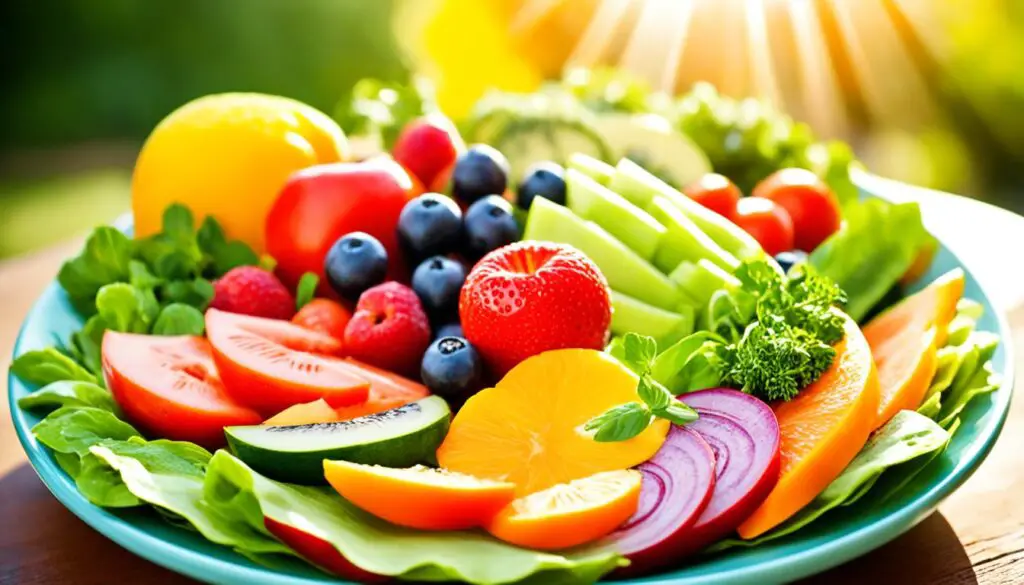
While the HCG diet may be popular, there are many alternatives that offer a safer and more sustainable approach to weight loss. These alternatives prioritize long-term success through individualized strategies and the development of healthy habits. When considering alternatives to the HCG diet, it is essential to consult with a healthcare professional or registered dietitian who can provide personalized guidance based on your specific needs and goals.
One alternative to the HCG diet is focusing on sustainable weight loss. Rather than resorting to extreme calorie restriction, this approach emphasizes gradual and steady weight loss over time. By making small, manageable changes to your eating and exercise habits, you can create a sustainable lifestyle that promotes lasting results. This alternative teaches you how to listen to your body’s hunger and fullness cues and helps you develop a healthier relationship with food.
Another alternative is taking an individualized approach to weight loss. This means recognizing that each person is unique and requires a tailored plan. Instead of following a one-size-fits-all diet, an individualized approach takes into account your preferences, lifestyle, and specific health considerations. This may involve working with a nutritionist or dietitian who can create a personalized meal plan and provide ongoing support and guidance.
Building healthy habits is another key aspect of effective weight loss alternatives. Rather than relying on short-term diets that provide temporary results, focusing on developing healthy habits leads to long-lasting success. This involves making sustainable changes to your diet, such as incorporating more whole foods, reducing processed foods, and practicing mindful eating. Additionally, establishing regular exercise routines and prioritizing self-care can contribute to overall well-being and weight management.
Consulting with a healthcare professional or registered dietitian is crucial when exploring alternatives to the HCG diet. They can provide evidence-based guidance and ensure that any changes you make to your diet and lifestyle are safe and appropriate for your individual needs. A healthcare professional will also be able to monitor your progress, address any concerns, and make adjustments as necessary.
By considering alternatives to the HCG diet that prioritize sustainable weight loss, an individualized approach, and the development of healthy habits, you can find a strategy that works best for you. Remember to consult with a healthcare professional to ensure that your weight loss journey is safe, effective, and tailored to your unique needs.
Conclusion
In conclusion, the HCG diet is a highly restrictive and controversial weight loss plan that combines extreme calorie restriction with HCG hormone supplementation. While it may lead to rapid weight loss initially, scientific evidence does not support its efficacy, and safety concerns surround the use of HCG hormone injections.
It is important to consider safer and more sustainable weight loss options. By exploring alternative approaches that focus on individualized plans and building healthy habits, individuals can achieve long-term success. Consulting with a healthcare professional or registered dietitian is recommended to determine the best approach for one’s specific needs and goals.
In summary, although the HCG diet may promise quick results, it is not a scientifically validated method for weight loss. Rather than relying on drastic calorie restriction and unapproved hormone supplementation, opting for sustainable approaches that prioritize overall health and well-being is a safer and more effective strategy.
FAQ
What is the HCG diet?
The HCG diet is a very low-calorie diet that is often used in conjunction with supplemental HCG hormone injections. It claims to stimulate weight loss by burning stored body fat but lacks scientific evidence to support these claims. The FDA has not approved HCG for weight loss.
What is HCG, and how does it work?
HCG, or human chorionic gonadotropin, is a hormone produced during pregnancy. In the context of the HCG diet, HCG is used to enhance metabolism and promote weight loss. The combination of HCG and caloric restriction is thought to contribute to rapid weight loss.
What factors affect metabolism?
Several factors can affect metabolism, including age, dehydration, eating habits, genetics, hormones, inactivity, medication, sleep deprivation, stress, and vitamin deficiencies.
What are the three phases of the HCG diet?
The HCG diet consists of three phases: the loading phase, the weight loss phase, and the maintenance phase. The loading phase involves high-calorie food intake while beginning HCG hormone supplementation. The weight loss phase is a drastic reduction in calories while continuing HCG hormone treatment. The maintenance phase gradually increases calorie intake while discontinuing HCG supplementation.
What foods are allowed on the HCG diet?
The HCG diet allows lean proteins such as chicken, egg whites, white fish, and lean beef. Non-starchy vegetables like spinach, cauliflower, and asparagus are also permitted. Limited fruits, including berries and citrus fruits, can be eaten. Seasonings like garlic, salt, and pepper can be used, and beverages allowed include coffee, tea, and water.
What foods should I avoid on the HCG diet?
On the HCG diet, you should avoid dairy products, carbohydrates such as bread and pasta, fats and oils, sugary foods, desserts, and beverages like soda, beer, and wine. These foods are restricted due to their high calorie and carbohydrate content, as well as their potential to interfere with the HCG diet’s desired effects on metabolism and weight loss.
Is the HCG diet effective and safe?
The effectiveness of the HCG diet is questionable, with no scientific evidence supporting its claims. While rapid weight loss may occur initially, it is not sustainable in the long term. Additionally, safety concerns surround the use of HCG hormone injections, which are not approved by the FDA for weight loss. The FDA has issued a warning about the safety and fraudulent weight-loss claims associated with HCG products.
What are the potential risks and side effects of the HCG diet?
The HCG diet can lead to severe hunger and increase the risk of disordered eating behaviors due to extreme calorie restriction. Nutrient deficiencies may also occur due to limited food choices. It’s important to note that over-the-counter HCG supplements are illegal and not regulated by the FDA, raising concerns about their safety and efficacy.
Are there alternatives to the HCG diet?
Yes, there are many alternatives to the HCG diet that are considered safer and more sustainable for weight loss. These alternatives focus on individualized approaches and building healthy habits for long-term success. It is recommended to consult with a healthcare professional or registered dietitian to explore these options and find an approach that suits your specific needs.

